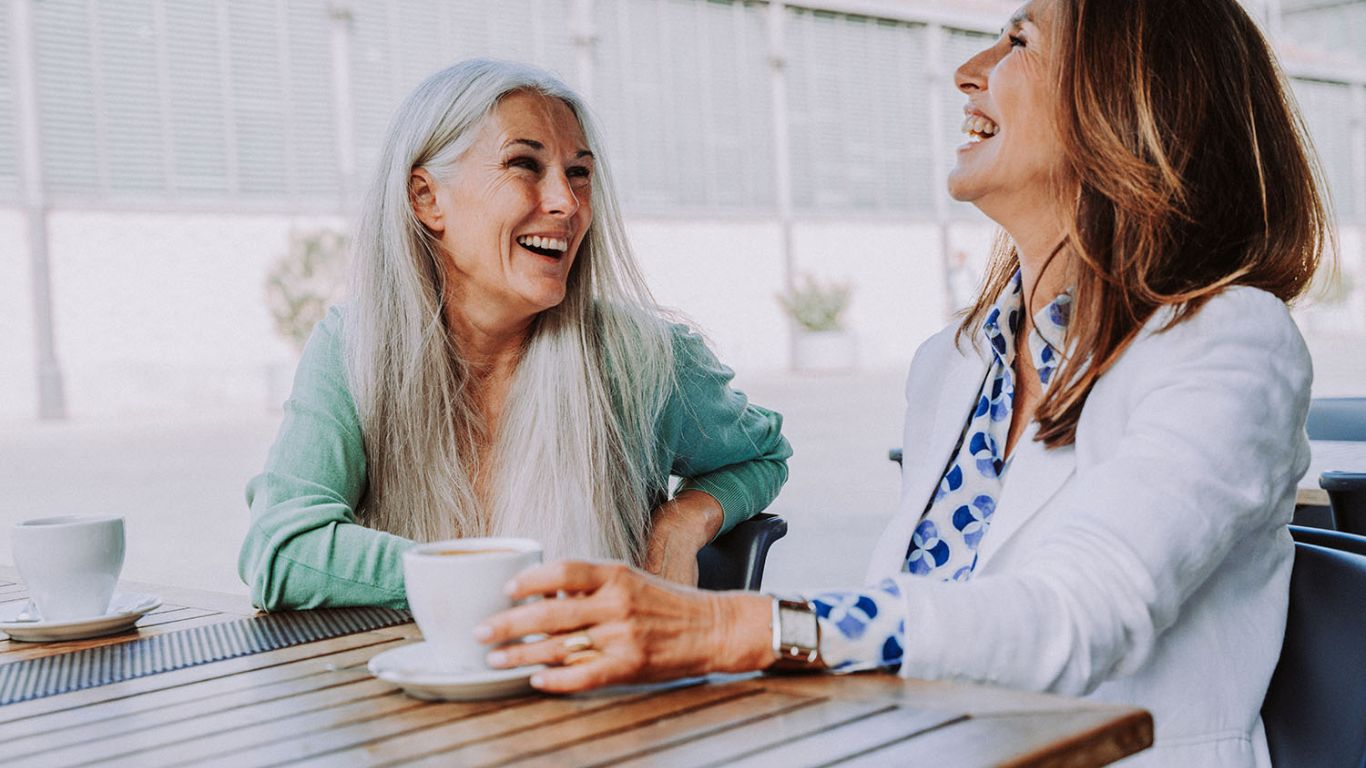Stress and Anxiety Q&A with Nutritionist Jessica
1st April 2021 / Health
Stress and Anxiety Q&A with Nutritionist Jessica
Emily Shannon

More and more evidence is suggesting the link between our lifestyle and the foods that we eat each day, with our stress and anxiety levels. So we wanted to catch up with Nutritional Therapist and yoga teacher Jessica to get some top tips for helping to manage stress and anxiety through the lifestyle choices that we make each day.
1. What are your favourite foods for supporting stress and anxiety?
Magnesium is a key nutrient to help support our ability to cope with stress and it has positive effects on our anxiety levels. However, it is often lacking in peoples’s diet. Almonds are a great source and did you know, it's better absorbed without the brown outer skin, so blanched almonds, almond flour and white almond butter are all great!
In stressed state antioxidants are really important to protect the cells and stay healthy, so eat the rainbow as well as including plenty of teas, herbs and spices in your diet. Vitamin C in particular is key so green leafy vegetables and berry fruits are fantastic sources.
Preliminary studies show that omega 3 levels can be negatively affected by stress. Omega 3 are anti-inflammatory and important for your brain and mood health. Therefore, I would recommend lots of oily fish (the smaller the better) such as sardines and anchovies.
2. We know that you are a big fan of breakfast, are there any key foods that you think that we can include as part of our breakfast that can help set us up for a day?
Having protein as part of breakfast is important for blood sugar balance and therefore stress levels. So eggs, salmon or Greek yoghurt are really good options as starting point. Then try adding some whole grains for B vitamins and slow release energy. Lastly it's important if you are going to get enough plant food into your daily diet a top tip is to include some at breakfast! Think spinach, mushroom, avocado, tomatoes or whole fruits.
If you are in any state of chronic or severe stress, whether that be emotional or physical (for example if you are feeling under the weather) it is important to nourish your body regularly so it is not more stressed by lack of blood sugar, which is why breakfast soon after waking is important.
3. Are there key herbs that you would recommend to people that are trying to reduce stress and beat anxiety?
My number one go to herb is ashwagandha it has been used for thousands of years in Ayurvedic medicine, but has also proven its worth in managing anxiety in modern scientific studies. It doesn’t seem to have any reported negative effects, and in my clinical experience, it suits most people with a positive experience.
Medicinal mushrooms too have been shown to have a good effect on calming the mind, reishi and lions mane are my favourite for this.
4. What are the key nutrients that are important for helping our bodies to regulate stress?
Our adrenal glands produce our stress hormones. Therefore, supporting them is really important if we want to control our physical reaction to stress. Firstly, we don’t want to overload them by triggering too much stress and secondly, we want to support them in their ability to regulate how much stress hormones they make.
Key nutrients for our adrenals are Vitamin C, Vitamin E, B complex and magnesium, these can be gained generally through a healthy diet and at times of increased stress supplemented to give you increased levels.
5. Nutritionally, we know that a healthy diet is important to help us all manage stress and combat anxiety, but how important is it to make time to eat well and not skip meals?
Our bodies primarily run off energy produced from glucose, available to cells in our blood. This glucose comes from the carbohydrate foods we eat. Our bodies need to maintain an ‘in range’ level of glucose in the blood, not to high and not too low. If glucose goes too low, it can trigger of a stress hormone called cortisol. High chronic circulating cortisol makes us feel ‘tired and wired’ or anxious. This is why our diet can be strongly related to our overall ability to cope with other stresses in our lives.
Eating well focusing on high fibre complex carbs from wholegrains, fruits and vegetables plus healthy fats and proteins is ideal. Intermittent fasting is a great way to improve your health but it does so by putting a minor stress on the body, so should be avoided if you are experiencing chronic stress. If that's the case meals should be eaten regularly.
6. Are there any common foods that we should try and avoid to help us combat stress and relieve anxiety?
Avoiding refined sugars and carbohydrates such a white grains and sweets, are important interventions to help blood sugar balance. Processed foods have been shown to have a negative effect on brain and mood health. Another key things to try and avoid are caffeine and alcohol as they can be difficult for the body to detoxify and effect blood sugar in a stress state so should be kept at a minimum.
7. What’s your favourite natural stress remedy?
Something as simple as breathing can be hugely beneficial. Breathing out for double the time your breath in for – whilst counting your breath can a hugely calming effect on the nervous system.
8. How important do you think meditation and yoga are as part of our daily routine?
I don’t think these in particular are that important, but finding ways to switch off, reset the mind and relax are super important. For some people mediation and yoga are great tools to do this for others, walking, gardening, taking up a craft, reading or listening to calming apps are can do the trick. It is finding what works for you. Counselling and journaling can be another way to explore why you feel stressed or anxious and therefore make changes to your life to feel less overwhelmed. The worse thing people can do though, is find more stress or pressure in trying to do a wellness solution. Sometimes letting go is the most important step.
9. Are there any key supplements that you think we should include daily to help to combat stress and anxiety?
Ashwangandha is my favourite for overall support during a stressful time. L-Theanine derived from green tea is one to take on an empty stomach to improve focus and relax the mind in the short run. I take it before public speaking but can also be used before bed to help switch off.
10. We know that mushrooms can help to manage stress and combat anxiety, so which is your favourite mushroom/mushrooms that we could include daily?
Reishi, traditionally known as the mushroom of immortality or eternal youth, it is ideal for stress and anxiety if taken in the day. Equally it can be taken before bed to help with insomnia.
11. What is your favourite type of yoga to help manage mood and anxiety?
This has changed over the years, I guess with my changing physical and emotional needs. I have practiced Iyengar, ashtanga, vinyasa and now my personal favourite is a slow hatha flow. I find the controlled and mindful movement combined with slow steady breath nourishes me both physically and emotionally. Iyengar is stopping and being still. Vinyasa and ashtanga can help burn off nervous energy. Finding the yoga which allows you to focus on your internal connection between body and breath, to be present, is the yoga can really help reduce stress and anxiety.
12. Do you have any top tips for people that might be suffering from daily stress or anxiety, that are easy to incorporate into their daily routine?
Eat well, breath, get outside and laugh as much as you can. Say yes, but also learn to say no to what overstresses you.
13. In light of our covid-19, and the UK under lockdown, do you have any guidance to help people get through this difficult time?
There is a lot of unknown in terms both our health and financial futures. This can definitely cause anxiety. However, focus on the positives, and try and stay present. Staying in touch and keeping busy are both important. Helping others can give a sense of calm and empowerment. Use this time to do something you have been putting off, whether that be starting a new hobby or clearing out the cupboards. We are all in this together and that I think can be comfort to us all.
From The Blog
-

25th February 2025 / Health
Empowering Women’s Health: Key Supplements for Well-being
Women’s health is a lifelong journey, with each stage presenting unique nutritional and wellness needs. From maintaining energy levels to supporting hormonal balance and bone health, the right comb...
Read article -

17th February 2025 / Health
Empowering Women’s Health: Lifestyle Tips and a Key Supplement for Perimenopause and Menopause
NaomiWomen’s health evolves through various life stages, and the transition into perimenopause and menopause brings unique challenges. During these phases, hormonal fluctuations can lead to symptom...
Read article -

10th February 2025 / Health / Products
The Best Foods and Drinks to Help Your Body Recover from Burnout
Burnout is a growing issue in today’s fast-paced work culture, leaving many people feeling exhausted, overwhelmed, and depleted. While rest and self-care are essential, nutrition plays a crucial ro...
Read article



